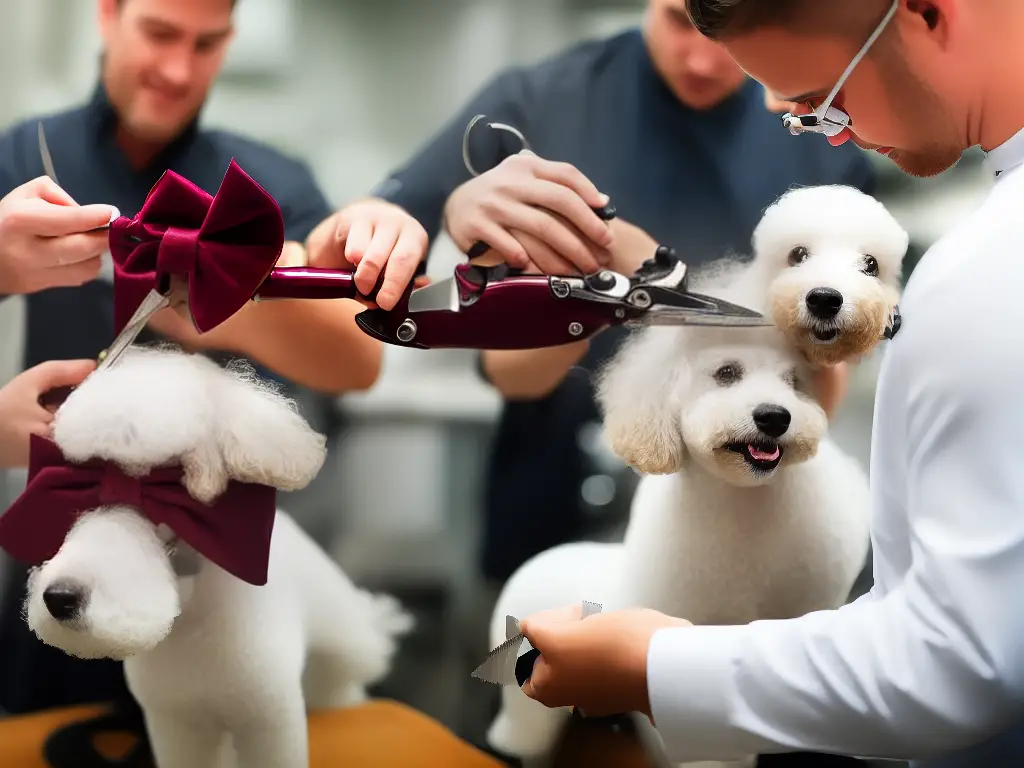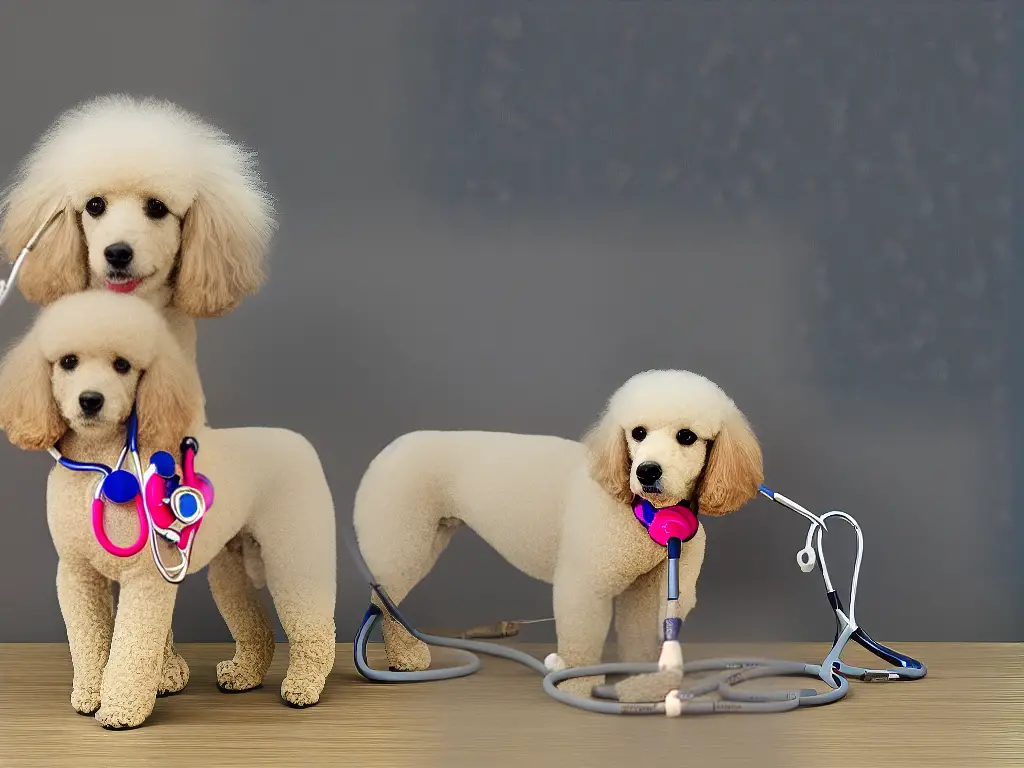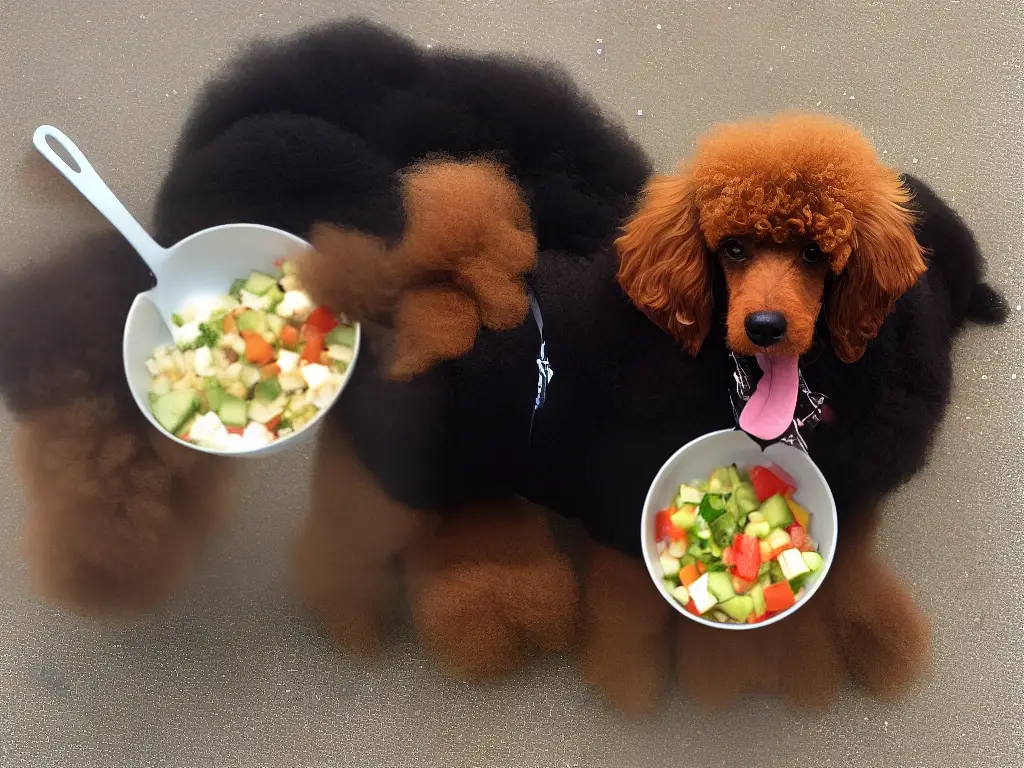Poodle Lifespan: How Long Will They Live
The impeccable intelligence, elegance, and affectionate nature of poodles have undeniably made them one of the most beloved dog breeds worldwide. As a poodle enthusiast or potential poodle owner, one must understand the various factors that play a role in determining their health, happiness, and life expectancy. These factors include the history and origins of poodles, the various sizes and types of poodles, common health issues, genetic predispositions, nutrition, exercise, grooming, mental health, preventative care, and breeder or adoption considerations.
Poodle Breed Overview
Poodles are a highly intelligent and versatile breed, with a rich history and origin that traces back to Western Europe. Originally bred as water retrievers, poodles assisted hunters in retrieving waterfowl from lakes and marshes. Over time, their adaptability allowed them to take on various roles, including military service, circus performance, and companionship.
Poodles come in three main varieties: toy, miniature, and standard, each differing in size and weight. The typical poodle lifespan varies between these varieties, with standard poodles generally living 12-15 years, miniature poodles 14-16 years, and toy poodles having the longest lifespan of 16-18 years.
One key contributing factor to the poodle’s longevity is its unique coat. Composed of curly and dense fur, the poodle’s coat is considered hypoallergenic, as it produces minimal dander and is less likely to cause allergic reactions in humans. Additionally, this coat also provides insulation, preventing the dogs from losing too much body heat when they swim in cold water. Regular grooming is essential to maintain the quality of the poodle’s coat, which can help improve overall health and contribute to a longer, healthier lifespan.
Another factor contributing to poodle lifespan is their level of intelligence. Known for being one of the smartest dog breeds, their intelligence enables them to learn quickly and adapt to various situations. High emotional intelligence, combined with a strong work ethic and eagerness to please, allows poodles to excel in various tasks and activities, including therapy work, scent detection, and agility competitions. Stimulating a poodle’s mind throughout its life can help maintain cognitive function and prevent mental deterioration, which can increase overall health and lifespan.
Although poodles are a relatively healthy breed, they are susceptible to certain health issues, some of which can affect their lifespan. Among the more common health problems are hip dysplasia, epilepsy, Addison’s disease, and progressive retinal atrophy. Responsible breeding practices can help mitigate the risks of genetic diseases and ensure that poodles have a longer, healthier life. Additionally, regular veterinary check-ups, vaccinations, and a balanced diet can also contribute to prolonging a poodle’s lifespan.
Exercise and socialization play a vital role in a poodle’s overall well-being, as they are an active and social breed that requires both physical and mental stimulation to thrive. Physical activity is crucial for maintaining a healthy body weight, which can prevent obesity-related health issues, while socialization helps poodles develop strong bonds with their families and cope with new environments. Providing poodles with a well-rounded lifestyle that includes adventure, play, and companionship is a key factor in extending their longevity and ensuring that they lead a happy, healthy life.

Poodle Health Issues
It is also essential to be aware of common health issues such as hip dysplasia, which affects poodles like many other dog breeds. This genetic disorder causes the hip joint to form improperly, resulting in the hind leg’s femoral head not fitting securely into the hip socket. Over time, this can lead to arthritis and other degenerative joint conditions. Symptoms of hip dysplasia in poodles may include stiffness, limping, or difficulty getting up from a lying position. Early detection and treatment are crucial in managing this condition, and responsible breeding practices can help minimize the risk of hip dysplasia in future generations. Treatment options can range from weight management, physical therapy, and anti-inflammatory medication to surgical intervention in more severe cases.
Allergies are another health concern for poodles, as they can suffer from both food and environmental allergies. Food allergies may manifest as chronic ear infections, skin issues, or gastrointestinal symptoms. The most common food allergens in dogs include beef, dairy, chicken, and wheat. Environmental allergies can cause skin irritations, itchiness, and excessive grooming or licking. Identifying the allergens and implementing a proper diet or management strategy can greatly improve your poodle’s quality of life. In some cases, veterinarians may recommend allergy medications or immunotherapy to control symptoms.
Heart disease also affects poodles and can come in various forms like congestive heart failure, dilated cardiomyopathy, and mitral valve disease. Detecting heart issues early is crucial to providing your poodle with the necessary care and prolonging their lifespan. Regular check-ups with your veterinarian are essential, and any suspected changes in your dog’s behavior or physical condition should be promptly reported. Symptoms of heart disease can include coughing, lethargy, exercise intolerance, difficulty breathing, and swelling in the abdomen or legs. Treatment for heart disease typically involves medication to manage symptoms and slow progression, with some cases requiring surgical intervention.
One more common health issue in poodles is epilepsy, a neurological disorder that causes recurrent seizures. The exact cause of epilepsy in poodles is not always identified but may be genetic, with the condition more prevalent in certain poodle lines. Seizures can range in severity from mild to severe and can be triggered by various factors like stress or changes in routine. Owners should learn to identify the signs of an impending seizure and monitor the frequency and duration of episodes. Treatment for epilepsy may include anti-seizure medication, dietary changes, or supportive therapies like acupuncture or CBD oils.
Lastly, progressive retinal atrophy (PRA) is a hereditary condition that affects poodles’ eyes, causing gradual deterioration of the retinal cells. This deterioration leads to a loss of vision, which may occur over several years, ultimately resulting in complete blindness. There is currently no cure for PRA, but early detection can help prepare the owner for the management of their dog’s blindness. Responsible breeding practices can reduce the prevalence of PRA in poodle populations, with genetic testing available for breeders to identify dogs carrying the genes responsible for this disease. Regular monitoring of a poodle’s vision and annual veterinary eye checks are crucial for its overall well-being.

Genetics and Lifespan
In addition to PRA, genetics play a significant role in determining a poodle’s lifespan, just like in all breeds. Predispositions to specific health problems contribute to this fact. While poodles are generally healthy, genetic health issues can impact their lifespans and quality of life. Potential poodle owners should be informed about these conditions and work with trusted breeders to minimize the risk, ensuring that their furry companions lead long and happy lives.
Hip dysplasia is one of the primary genetic concerns for poodles. It is an abnormal development of the hip joint, which can lead to arthritis, pain, and limited mobility. While hip dysplasia is more common in standard poodles, it can affect miniature and toy poodles as well. Responsible breeders screen their breeding dogs for hip dysplasia, and only breed those with healthy hips to minimize the risk of passing the condition to their offspring.
Progressive retinal atrophy (PRA) is another genetic condition that affects poodles of all varieties. It is an eye condition that can lead to blindness due to the deterioration of photoreceptor cells in the retina over time. Genetic testing can help detect the condition, and responsible breeders screen their breeding dogs for PRA to prevent the passing of the condition to their puppies.
Poodles can also suffer from certain heart issues such as subvalvular aortic stenosis (SAS), which is a narrowing of the aortic valve in the heart. This can lead to reduced blood flow and eventually heart failure. While this condition is more common in larger breeds, it can also affect poodles. Breeders should perform heart screenings on their dogs to prevent the passing of this condition to their offspring.
Poodles, known for their intelligence and elegance, may experience varying lifespans due to specific health concerns such as autoimmune disorders or epilepsy, stemming from genetic inheritance. Regular veterinary care and collaboration with reputable breeders can help manage and minimize the impact of these conditions on a poodle’s health and longevity. Being proactive and informed about these inherited health issues can assist owners in ensuring their poodles have the lengthiest and healthiest lives possible.

Nutrition and Diet
In addition to regular veterinary care, nutrition and diet play a crucial role in determining the health and lifespan of a poodle. Providing the right balance of nutrients, vitamins, and minerals is essential to maintain their overall wellbeing, prevent diseases, and support an active lifestyle. By understanding their specific dietary requirements and creating a feeding plan tailored to their needs, poodle owners can further contribute to their pet’s optimal growth, vitality, and longevity.
Poodles, like other dog breeds, require a diet that contains a proper balance of protein, carbohydrates, fats, vitamins, and minerals. High-quality protein serves as the foundation of their diet, as it is essential for building and maintaining muscle mass. Choose protein sources like lean meat, fish, poultry, and eggs for easy digestibility and essential amino acids. Complex carbohydrates like sweet potatoes, brown rice, or barley provide the energy necessary for their daily activities, while healthy fats like fish oil, olive oil, or flaxseed oil ensure a glossy coat and optimal brain function.
Vitamins and minerals are critical for maintaining your poodle’s overall health. For instance, vitamin A supports vision, bone growth, and immune system functioning, while B vitamins aid metabolism and the maintenance of a healthy coat. Minerals like calcium, phosphorus, and magnesium contribute to strong bones and teeth, while trace minerals like iron, zinc, and copper are crucial for various biochemical processes in the body. Make sure your poodle’s diet includes fruits, vegetables, and dog-safe supplements to cover these needs.
When it comes to feeding guidelines, the specific amount of food your poodle needs may vary depending on factors like age, size, activity level, and individual metabolism. Generally, young, growing poodles require more calories and nutrients than adult dogs. Puppies should be fed smaller, more frequent meals throughout the day until they reach adulthood, at which point you can transition to two or three meals per day. Monitor your poodle’s weight and adjust the feeding amounts according to the body condition score, which is an effective way to determine if your dog is underweight, overweight, or in ideal shape. Consult with your veterinarian to decide the best feeding plan and serving sizes for your poodle.
Proper nutrition, including providing fresh water at all times, is crucial for maintaining a poodle’s overall health and preventing issues related to dehydration, such as urinary tract infections. Clean and refill the water bowl daily, and ensure it is easily accessible at all times. By following these guidelines and maintaining a close relationship with your veterinarian, you can support your poodle’s lifelong health and wellbeing, contributing to a happier and more extended life.

Exercise and Physical Activity
In addition to proper nutrition, regular exercise and physical activity are essential in maintaining a poodle’s overall health, improving their quality of life, and potentially extending their lifespan. Poodles, known for their intelligence, agility, and energetic nature, require consistent physical stimulation to keep them engaged and fit. By incorporating both nutrition and exercise into your poodle’s routine, you can ensure they lead a healthy and happy life.
These activities not only provide the necessary exercise but also help to promote mental stimulation, reducing boredom and anxiety, which can often lead to destructive behavior.
Exercise and physical activities suited for poodles may vary based on age, size, and energy levels. However, some of the common activities suitable for this breed include:
- daily walks
- jogging
- playing fetch
- agility training
- swimming
- dog sports like obedience, rally, or flyball
Regularly engaging in these activities can help improve their cardiovascular health, maintain a healthy body weight, keep joints and muscles strong, and foster positive behaviors. It is crucial to choose activities that are appropriate for your poodle’s size and temperament to avoid stressing or overworking the dog.
Different sizes of poodles may require varying amounts and types of exercise. Standard poodles might need more extensive and rigorous activities, such as longer walks or more intense agility sessions. In contrast, miniature and toy poodles could have shorter walks, playtime in a fenced yard, or even indoor play sessions with toys and puzzles.
Poodle puppies require careful consideration when exercising, as their growing joints and bones can be more susceptible to injury. It is essential to consult with your veterinarian about the most suitable exercise routine for your poodle based on their age, size, and overall health.
It is vital to monitor your poodle’s exercise routine, ensuring that they receive the proper amount of physical activity in a safe manner. In extreme temperatures, shorten your poodle’s outdoor activities, avoid hot pavement and provide a shaded area during warmer months to prevent overheating. Additionally, always examine your dog for signs of exhaustion, discomfort, or injury during any physical activity and respond accordingly.
Ensuring a healthy and fulfilling life for your poodle requires both consistent exercise and appropriate grooming. Including regular exercise and physical activity in your poodle’s routine is a key component in contributing to their overall health and extending their lifespan. Remaining proactive in your poodle’s exercise regime not only benefits their physical well-being but also fosters a strong bond between you and your pet. Remember that every poodle is unique, so catering to their individual needs and preferences is crucial.

Grooming and Dental Care
Alongside exercise, regular grooming is essential in maintaining the health and well-being of poodles, as it helps to promote a long and healthy life. The significance of grooming should not be taken lightly, given that poodles are notorious for their curly and dense coats which require a considerable amount of care to prevent matting. Grooming not only keeps your pet looking and feeling its best but also allows you to identify any potential health issues early on, such as skin irritations, infections, or the presence of parasites. Thus, combining both regular exercise and grooming will greatly contribute to the overall health and happiness of your poodle, ensuring they lead a long and enjoyable life.
Coat maintenance is crucial in prolonging the lifespan of a poodle. This breed has a unique hair growth cycle, with the hair continuously growing until it is cut. Regular brushing is necessary to prevent tangles and matting, which can lead to skin irritations and infections if left unaddressed. Moreover, a well-groomed coat acts as an insulating layer, protecting a poodle from the cold in winter and from the sun’s harmful rays in the summer months. Depending on your poodle’s lifestyle and activity level, you may need to brush their coat daily or every few days to keep it in optimal condition.
Investing in the dental care of your poodle is another vital aspect of promoting longevity. Like humans, pets can develop dental issues such as gum disease, plaque buildup, and tooth decay when proper dental hygiene is neglected. These problems can lead to a host of health complications, including infections and heart diseases, which significantly affect a poodle’s quality of life and lifespan. Regular dental check-ups, daily tooth brushing, and providing your pet with dental chews are all beneficial in maintaining healthy teeth and gums.
To further ensure your poodle’s long and healthy life, consider professional grooming services. Professional groomers are adept at handling poodles with different coat types and are equipped with the expertise and tools needed to provide thorough grooming care. Seeking professional help can make a significant difference in your poodle’s overall health and happiness, as it allows for a comprehensive assessment of your pet’s coat, nails, ears, and other aspects of grooming. Regular visits to a professional groomer can help to keep your pet looking clean, comfortable, and healthy throughout their life.
In conclusion, incorporating regular grooming, coat maintenance, electrical dental care practices into your poodle’s routine is indispensable in promoting longevity. Taking proper care of a poodle’s charming and unique coat, as well as investing in its dental health, can lead to a myriad of benefits that positively contribute to their overall well-being. With the right care and attention, you can help ensure your poodle lives a long and healthy life, full of happiness and companionship.

Mental Health and Socialization
Furthermore, mental health and socialization play an essential role in a poodle’s overall well-being, impacting their quality of life and potentially their lifespan. Poodles are intelligent, active, and social dogs that crave mental stimulation and regular interaction with people and other animals. Ensuring that they receive proper socialization and mental enrichment can help prevent the development of behavioral issues, anxiety, and depression, which can ultimately affect their overall health and longevity.
Socialization
One of the vital components that contribute to a poodle’s mental health is socialization. Proper socialization involves introducing puppies to new situations, people, and other animals in a positive and controlled manner from a young age. Socialization helps poodles build confidence and learn interpersonal skills necessary for navigating their world, as well as exposing them to various environments and situations. It is important to continue socializing your poodle throughout their life to maintain those skills and prevent them from becoming fearful or aggressive.
Mental Stimulation
In addition to socialization, poodles require plenty of mental stimulation to keep their intelligent minds engaged and active. Certain activities, such as puzzle toys, interactive games, and learning new tricks, can offer the mental challenges that poodles need to thrive. Providing opportunities for mental enrichment can prevent boredom and, ultimately, the development of destructive behaviors, which can impact a poodle’s overall well-being and lifespan.
Obedience Training
Obedience training plays a key part in ensuring your poodle’s mental health. Due to their high intelligence, poodles can quickly learn new commands and enjoy the challenge that training provides. Training also strengthens the bond between an owner and their poodle, which fosters a sense of security and contentment. This bond is crucial for the well-being of your poodle, as they tend to develop strong attachments to their family members and may experience separation anxiety if left alone for extended periods.
Regular Exercise
To support a poodle’s mental well-being, regular exercise is essential. This not only provides physical benefits, but also contributes to maintaining a healthy state of mind. Engaging in regular physical activities, such as walks or playtime at the dog park, as well as participating in canine sports like agility, can help prevent anxiety or depression. Exercise offers a healthy outlet for energy, promotes relaxation, and helps to keep a poodle’s cognitive abilities sharp. All of these factors contribute to a healthier and potentially longer life for your poodle.

Preventative Care and Regular Vet Visits
Consistent Preventative Care and Veterinary Visits
Another crucial aspect for ensuring a long and healthy life for your poodle is providing consistent preventative care and scheduling regular veterinary visits. By being proactive and taking measures to prevent potential health issues rather than waiting for signs of illness to emerge, you promote overall well-being for your poodle. Early identification of any medical concerns, along with regular exercise, plays a vital role in helping your poodle enjoy a longer lifespan.
Vaccinations are an essential aspect of preventative care for Poodles, as they protect against potentially life-threatening diseases. Core vaccines, including those for rabies, distemper, parvovirus, and adenovirus, should be administered according to the recommended schedule provided by your veterinarian. Your vet may also recommend additional vaccines based on your Poodle’s age, lifestyle, and regional risks, such as those for Lyme disease, leptospirosis, and kennel cough.
Regular veterinary checkups serve as an invaluable tool in maintaining the health of Poodles and extending their lifespan. These appointments give your veterinarian the opportunity to thoroughly examine your dog for any irregularities or potential health concerns. A typical wellness visit will include a physical examination, heartworm test, dental check, and bloodwork to monitor organ function and detect any abnormalities. Most veterinarians recommend annual checkups for young and middle-aged Poodles, with more frequent visits for older dogs or those with chronic health issues.
In addition to vaccinations and routine vet visits, proper dental care plays a vital role in your Poodle’s overall health and longevity. Periodontal disease can lead to tooth loss, pain, and infections that may spread to other organs if left untreated. Regularly brushing your Poodle’s teeth with a canine toothpaste, providing dental chews, and scheduling professional dental cleanings at your veterinary office can help prevent dental issues and contribute to a longer, healthier life for your Poodle.
Proper care can greatly impact the lifespan of your poodle, and one key aspect of this is a balanced, nutrient-rich diet. Feeding a high-quality commercial dog food or a carefully planned homemade diet can help prevent obesity, support immune function, and maintain overall health. Regular exercise and mental stimulation also contribute to a longer lifespan, as they support muscle tone, weight management, and cognitive function. By prioritizing preventative care, vaccinations, and consistent vet checkups, you can help your Poodle to enjoy a longer, healthier life.

Breeder and Adoption Considerations
Another factor to consider when adopting a poodle is the dog’s source, as there are differences between obtaining a poodle from a reputable breeder and adopting from a rescue or shelter. Poodles from reputable breeders often come with health guarantees and records of their lineage, providing a clear picture of the dog’s genetic history and potential health issues. This information can be helpful in determining the expected lifespan of your poodle. Reputable breeders also ensure that their breeding dogs are free from genetic diseases and well cared for, which increases the likelihood of the puppies having a longer and healthier life.
On the other hand, adopting a poodle from a rescue or shelter can also be a fulfilling option for potential owners. Poodles who are surrendered to shelters may still have plenty of love to give and can live long, happy lives with the proper care. However, there may be less information available about the dog’s background, and potential owners should be prepared for possible unknown health issues. Despite this, many rescue organizations and shelters have screening processes to ensure that the dogs in their care are in good health and have been properly vaccinated.
One aspect of ensuring a longer lifespan for your poodle, regardless of its origin, is proactive management of any health issues. Regular veterinary visits are essential for early detection of problems that could otherwise become more significant over time. Researching common health issues in poodles can also help owners be proactive about their care. For example, toy and miniature poodles are prone to dental issues due to their small mouths, so implementing a dental care routine early on can help prevent problems later in life.
When selecting a breeder or shelter, take the time to ask questions and gather as much information as possible. Find out about the dogs’ health histories, if available, and be sure to ask about any guarantees or return policies offered by the breeder or shelter. Additionally, consider asking for references from previous buyers or adopters to get a sense of their experiences and satisfaction with the animals they acquired.
Lastly, it’s essential to remember that while researching and being conscientious about a poodle’s origin can help guide you toward a longer-living, healthier dog, responsible pet ownership plays an even more significant role. Providing regular veterinary care, a proper diet, exercise, and a loving environment will help ensure that your poodle lives a long and healthy life, regardless of whether they come from a breeder or a shelter. Cultivating a strong relationship with your poodle will ultimately lead to a happy life for both you and your canine companion, regardless of their origins.

With a strong emphasis on a poodle’s general well-being, proper nutrition, exercise, grooming, mental health, socialization, and regular veterinary checkups, it is possible to ensure a long, healthy, and happy life for these intelligent and loving companions. Careful consideration of a poodle’s origin, whether from a reputable breeder or a shelter or rescue, can also contribute to their overall health and longevity. By staying informed and investing in their care and well-being, poodle owners can ultimately nurture a deep, lifelong bond with these remarkable dogs.

